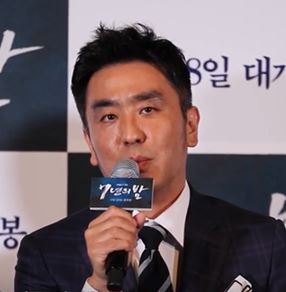
South Korea, officially the Republic of Korea (ROK), is a country in East Asia. It constitutes the southern part of the Korean Peninsula and borders North Korea along the Korean Demilitarized Zone. The country's western border is formed by the Yellow Sea, while its eastern border is defined by the Sea of Japan. South Korea claims to be the sole legitimate government of the entire peninsula and adjacent islands. It has a population of 51.96 million, of which roughly half live in the Seoul Capital Area, the fourth most populous metropolitan area in the world. Other major cities include Incheon, Busan, and Daegu.

Jeong Yong-jun, better known as Jang Hyuk, is a South Korean actor. He is best known for his leading roles in the films Volcano High (2001), Windstruck (2004), The Swordsman (2020), The Killer: A Girl Who Deserves to Die (2022), and the television dramas Successful Story of a Bright Girl (2002), Thank You (2007), The Slave Hunters (2010), Deep Rooted Tree (2011), You Are My Destiny (2014), Voice (2017), Money Flower (2017), Wok of Love (2018), My Country: The New Age (2019), Tell Me What You Saw (2020) and Bloody Heart (2022).

Islam (Korean: 이슬람교) is a minor religion in South Korea and North Korea. The Muslim community is centered in Seoul and there are a few mosques around the country. According to the Korea Muslim Federation, there are about 200,000 Muslims living in South Korea, and about 70 to 80 percent are foreigners. Seoul alone has 40% of South Korea's total Muslim population. The Ministry of Foreign Affairs has hosted an Iftar dinner during the month of Ramadan every year since 2004. Among Koreans, Muslims consist of only 0.4% of the total population. However, the increasing immigration of Muslims to Korea is allowing the Muslim communities in Korea to continue to grow.
A recognizable community of Chinese people in Korea has existed since the 1880s, and are often known as Hwagyo. Over 90% of early Chinese migrants came from Shandong province on the east coast of China. These ethnic Chinese residents in Korea often held Republic of China and Korean citizenship. The Republic of China used to govern the entirety of China, but now only governs Taiwan province and a minor part of Fujian province. Due to the conflation of Republic of China citizenship with Taiwanese identity in the modern era, these ethnic Chinese people in Korea or Hwagyo are now usually referred to as "Taiwanese". However, in reality most Hwagyo hold little to no ties with Taiwan.

Ju Ji-hoon is a South Korean actor and model. His first leading role was in the 2006 hit drama Princess Hours. His other notable works include Lucifer, Antique, Mask, Along with the Gods: The Two Worlds and its sequel, The Spy Gone North, Dark Figure of Crime, Kingdom, and Jirisan.

Ahn Sung-ki is a South Korean actor. One of the country's most respected actors, he has appeared in more than 130 films during his career of over 60 years.

Jang Keun-suk is a South Korean actor and singer. He is best known for starring in the Korean television dramas Beethoven Virus (2008), You're Beautiful (2009), Mary Stayed Out All Night (2010), Love Rain (2012), Pretty Man (2013), The Royal Gambler (2016), and Switch (2018).

Kim Hyun-joong is a South Korean actor, singer and songwriter. He is a member of the boy band SS501 and played roles in the Korean dramas Boys Over Flowers and Playful Kiss.

Seoul, officially the Seoul Special City, is the capital and largest metropolis of South Korea. It forms the heart of the Seoul Capital Area, which also includes the surrounding Incheon metropolis and Gyeonggi Province. Considered to be a global city and rated as an Alpha city by the Globalization and World Cities Research Network (GaWC), Seoul was the world's fourth largest metropolitan economy in 2014, following Tokyo, New York City, and Los Angeles.

Kim Jae-joong, also known mononymously as Jaejoong in South Korea and Jejung/J-Jun (ジェジュン) in Japan, is a South Korean singer, songwriter, actor and director. He is a member of the Korean pop group JYJ and was one of the original members of boy band TVXQ, where he was formerly known by the stage name Hero Jae-joong. Since 2013, he has expanded his range of activities as a solo artist, and in 2023, he formed his own agency iNKODE where he serves as the Chief Strategy Officer.
Racism in South Korea comprises negative attitudes and views on race or ethnicity which are related to each other, are held by various people and groups in South Korea, and have been reflected in discriminatory laws, practices and actions at various times in the history of South Korea against racial or ethnic groups. It has been recognized as a widespread social problem in the country. South Korea lacks an anti-discrimination law, which was recommended by the UN Human Rights Committee in 2015. The law has been reported stalled due to "lack of public consensus".

Uhm Hong-sik, known professionally as Yoo Ah-in, is a South Korean actor, creative director, and gallerist. He is known for playing a diverse spectrum of roles in both television and film, where he often portrays dynamic characters who exhibit significant personal growth. He is the recipient of various accolades including Asian Film Awards, Fantasia International Film Festival's Cheval Noir award, two Blue Dragon Film Awards and two Baeksang Arts Awards. He is best known for his leading roles in coming-of-age film Punch (2011), melodrama Secret Affair (2014), action blockbuster Veteran (2015), period drama The Throne (2015), historical television series Six Flying Dragons (2015–2016), psychological thriller mystery drama Burning (2018), zombie film #Alive (2020), indie crime drama film Voice of Silence (2020), and dark fantasy series Hellbound (2021).

Song Joong-ki is a South Korean actor. He rose to fame in the historical coming-of-age drama Sungkyunkwan Scandal (2010) and the variety show Running Man (2010–2011) as one of the original cast members. Since then, he has played a diverse spectrum of roles in the television series The Innocent Man (2012), Descendants of the Sun (2016), Arthdal Chronicles (2019), Vincenzo (2021), and Reborn Rich (2022), as well as the hit films A Werewolf Boy (2012), The Battleship Island (2017), and Space Sweepers (2021).

Lee Jong-suk is a South Korean actor and model. He debuted in 2005 as a runway model, becoming the youngest male model ever to participate in Seoul Fashion Week. Lee's breakthrough role was in School 2013 (2012). He is also well known for his roles in I Can Hear Your Voice (2013), Doctor Stranger (2014), Pinocchio (2014), W (2016), While You Were Sleeping (2017), Romance Is a Bonus Book (2019), and Big Mouth (2022).

Ryu Seung-ryong is a South Korean actor. Ryu began his acting career in theater, subsequently becoming one of the most versatile supporting actors in Korean film and television. In 2013, he headlined Miracle in Cell No. 7, which became the third highest grossing Korean film of all time, in 2014 he starred in historical film The Admiral: Roaring Currents, which is currently the highest-grossing film of all time in South Korea, and in 2019 he headlined the comedy film Extreme Job, which is currently the 2nd highest-grossing film of all time in South Korea. Ryu is the first Korean to star in four movies that have drawn over 10 million viewers each.

Lee Joon-gi is a South Korean actor, singer, dancer, and model. He rose to fame on his first leading role playing a clown in the critically acclaimed film The King and the Clown (2005) and gained further recognition in the romantic comedy My Girl (2005−06). Since then, he has diversified into other genres such as historical dramas (sageuk) and action thrillers. He is also known for his roles in Iljimae (2008), Arang and the Magistrate (2012), Moon Lovers: Scarlet Heart Ryeo (2016), Lawless Lawyer (2018), and Flower of Evil (2020).

Seoul International Drama Awards, simply known as SDA, is an annual award ceremony based in Seoul, South Korea which honors excellence in television drama productions worldwide.

Tyler Josef Rasch is an American writer, educator, lecturer, actor, and television personality in South Korea. He was the author of bestseller "No Second Earth " and a cast member of hit TV shows such as JTBC's Non-Summit and tvN's Hot Brain: Problematic Men. among others. He has received various awards and distinctions for his work in media, education, and social and environmental issues.

Descendants of the Sun is a 2016 South Korean television series starring Song Joong-ki, Song Hye-kyo, Jin Goo, and Kim Ji-won. It aired on KBS2 from February 24 to April 14, 2016, for 16 episodes. KBS then aired three additional special episodes from April 20 to April 22, 2016, containing highlights and the best scenes from the series, the drama's production process, behind-the-scenes footage, commentaries from cast members and the final epilogue.

Camarata Music Company, now known as Camarata Music, is an international non-profit music organization in Seoul, South Korea. It was created for both native Koreans and foreign expatriates. Camarata currently consists of five musical ensembles: the Camarata Chorale, Camarata Chamber Singers, Camarata Junior Choir, Camarata Youth Choir, and Camarata Orchestra. Camarata Music is currently led by its founder and Music Director, Dr. Ryan Goessl. To date, Camarata has performed over 300 concerts since its founding. It has members from more than 106 countries.



















